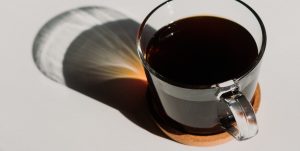You may have heard that light-roast coffee is less bitter than medium and dark roast coffee. This is a question that many coffee lovers love debating, as well as whether light roasting has certain advantages over dark roasting. So, is light roast coffee less bitter than dark ones?
Contents
Is Light Roast Coffee Less Bitter?
Light roast coffee is likely to taste less bitter than dark roast coffee while retaining classic coffee aromas and flavors. There will be more acid lactones in light to medium roasts, which give them a “pleasant, coffee-like bitterness taste quality.” On the other hand, darker roasts have more phenylindanes (acids that produce the sensation of bitterness), which creates a “lingering, harsh taste sensation.”

The higher the roast level, the more acids are converted into phenylindanes and other compounds that produce an undesirable taste. It should be noted, however, that other factors, such as an error in the preparation process, could affect the bitterness of the final cup of coffee.
Factors That Could Influence the Bitterness of the Finished Cup of Coffee
Aside from the roast level, other factors may affect the bitterness (or lack thereof) of brewed coffee: These include:
- Cleanliness of brewing equipment
- Coffee-to-water ratio
- Bean quality
- Infusion duration
- Grind size
Cleanliness of Brewing Equipment
The cleanliness of your brewer and its equipment is important to consider because it can directly impact the taste of your brew. For instance, if your brewer has been used for weeks or months without a thorough cleaning, it could harbor bacteria or mold spores that could affect the coffee’s taste.
If you don’t clean the brewer regularly, there’s also a chance that oils from previous brews will build upon their inner workings and affect future brews by altering their flavor or aroma.
Coffee-To-Water Ratio
The coffee-to-water ratio is one of the most important factors in the taste of your finished cup of coffee. The ratio is determined by the amount of coffee grounds you use for each cup of water.
If you use too much coffee, it will make your coffee taste bitter and muddy. If you use too little coffee, it will be watery and weak. The standard ratio is two tablespoons of ground coffee per six ounces of water.
Bean Quality
Beans from different regions will have slightly different tastes, even if they’re roasted in similar ways and for similar lengths of time. Each region has unique soil conditions and climate, influencing how much flavor comes out during roasting.
Infusion Duration
The duration of your infusion can also impact how bitter your coffee tastes. If you brew your coffee for too long, it will become over-extracted (which results in a bitter taste); if you don’t brew it long enough, it won’t have enough flavor. The ideal time to infuse your coffee depends on the type of coffee maker you are using and its size.
Grind size
As you know, there are many different types of grinders on the market, and they all produce different sizes of ground coffee. If you use a fine grind, more surface area will be exposed to water during brewing, increasing extraction and bitterness (the more extraction, the more bitter).
Other Benefits of Lighter Roasts Over Darker Roasts
In addition to the great taste and aroma of the coffee, there are other benefits to choosing a lighter roast over a darker roast.
Higher Chlorogenic Acid Levels
The lighter the roast, the greater the chlorogenic acid level, and the more the coffee extract safeguards human cells from cellular damage.
Chlorogenic acid has antioxidant properties that may reduce the risk of heart disease by improving the blood lipid profile and inhibiting LDL oxidation. Chlorogenic acid also inhibits glycogen phosphorylase, an enzyme that helps regulate blood glucose levels after eating. This can help with weight loss since it slows sugar absorption into your bloodstream.
Increased Antioxidant Properties
In a study published in the Journal of Environmental Science 2020, scientists found that antioxidant activity reached a maximum level with light roasts. Then, antioxidant activity decreased as the heating process created dark roasts.

Increased Anti-inflammatory Properties
According to research, the anti-inflammatory effects of light roasts are greater than those of dark roasts, However, note that these findings were based on cell cultures, not humans.
The researchers found that light-roast coffee increased levels of cyclooxygenase (COX) by about 50% compared to dark-roast coffee. COX is an enzyme that produces inflammatory prostaglandins, which play a role in pain perception.
Related Questions
How Do You Reduce Bitterness in Coffee?
To reduce bitterness, you must extract less tannin from your coffee beans. To do this, follow these tips: Use high-quality water, brew your coffee at the right temperature, grind your beans before brewing and use fresh grounds.
What Coffee Has No Bitter Taste?
Arabica coffee beans produce less bitter coffee than robusta coffee beans. Roasted light to medium, premium arabica coffee hardly has any bitterness. You may be sure you’re getting a cup of coffee without any bitterness by purchasing it from a local, independent specialty coffee roaster.
Conclusion
Light roast coffee tastes less bitter than dark roast while retaining those classic coffee aromas and flavors. However, other factors could affect the bitterness of the finished cup of coffee. Drinking lighter roasts of coffee also provides numerous health benefits over dark roasts.




